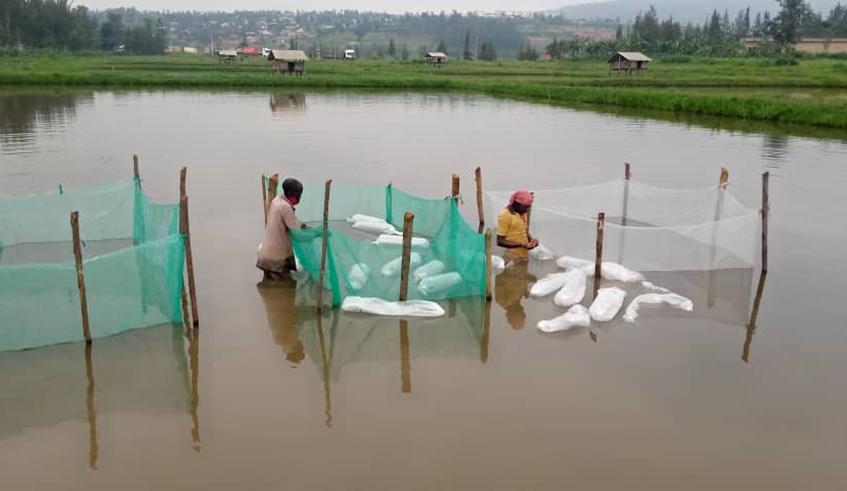Africa-Press – Rwanda. Of late, individual fish farmers have started venturing into the new form of fish farming. Twenty nine year old Eric Ndagijimana is one such farmer who believes that there is high demand for fish in the country due to its high protein content.
The university graduate in wildlife and aquatic resources management is passionate about fish, something that led him to pursue a career in fish farming.
“I wanted to help keep lakes safe and improve people’s income and provide quality protein food in our country,” he says.
Some of Ndagijimana’s cage fish ponds in Kigali,he has a total of 11 fish ponds farms with capacity of holding 42,000 fish. Photo: Courtesy.
The young entrepreneur pursued his passion starting 2016, immediately after his graduation joining Rwanda Rwasave fish farm that is located in the Northern part of the country, to gain professional skills.
After spending a few years in a fish farm, he left for Israel in 2018 for further professional training in aquaculture and crop production. The trip, he says, was an eye opener and was to determine his next steps as he charted his career.
At the moment, Ndagijimana has 11 fish pond farms in Kigali with a capacity of holding 42,000 fish. He however cites lack of materials used to control water parameters and environmental changes and lack of quality affordable feed as some of the setbacks he faces as a fish farmer. He nevertheless plans to apply Aquaponics Technology in order to optimise on both fish farming and vegetable production.
Cooperative support
The Rwanda Animal Resources Improvement Comparative (RARICO) has been providing technical and skills support to the likes of Ndagijimana. “We provide technical assistance to enhance the management and production in quantity, quality, cooperative management and organization of existing fishponds in the country,” John Bosco Bizimana, chairman of RARICO said.
RARICAO also helps farmers in accessing credit from financial institutions. “Our aim is to increase fish production and quality and ensure that farmers acquire skills that will help improve their production,” he affirms.
Securing food security through fish farming
Meanwhile, the government has embarked on cage fish farming in ponds and lakes in a bid to improve its food security status. The program is being undertaken by the Rwanda Agriculture and Animal Resources Development Board in the Ministry of Agriculture and Animal resources, which is expected to boost fish farming in the country.
According to Rwanda’s fisheries and fish farming Master Plan, a total of 1,063,000 tons of fish can be generated annually from the aquaculture sector alone.
The government notes that while intensive fish farming requires higher investment, it has a greater potential to increase aquaculture production, with a target of more than 55 percent contribution to fish production.
Untapped resources
Currently Lake Kivu and Lake Muhazi are the only lakes being exploited while Lakes Burera and Ruhondo remain untapped for cage fish farming. While Lake Kivu has a potential of over 2,000 hectares that can be used for cage farming, only 267.1 hectares are being utilized.
Solange Uwituze, Deputy Director General in charge of Animal Resources Research and Technology Transfer at Rwanda Agricultural Board (RAB) observes that not all fish farmers are contributing to the production due to financial challenges and effects of Covid 19 pandemic.
Despite all these, Uwituze says the government is helping in attracting more investors in the aquaculture and aqua feed manufacturing sector. She says that the government is also ensuring that farmers secure affordable fingerlings,access insurance and finance, and build their capacity in fish production.
“We are also trying to improve the quality, quantity, and affordability of fish feed available at the local market,” Uwituze added.
For More News And Analysis About Rwanda Follow Africa-Press






